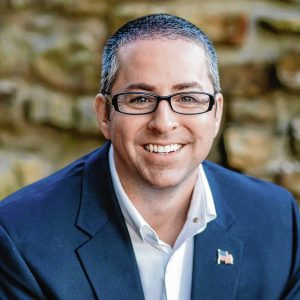The candidates running to represent District 5 on the Greenwood Common Council have very different visions for the current state of the city.
J. David Hopper, the incumbent in District 5 since 2012, sees Greenwood on an increasingly upward trajectory, even if improvements can be made. His opponent, former mayoral candidate Dale Marmaduke, thinks the city is moving in the wrong direction and needs a course correction.
The two will square off in May’s primary election with the hopes to represent District 5, the city’s most western district stretching from County Line Road in the north to Whiteland Road in the south, mostly centered around State Road 135.
Only residents living within those boundaries will get to vote in this race.
Whoever wins in the primary will currently be unopposed in November’s general election, though there is still time for additional candidates to file.
About the job
What: Greenwood City Council District 5
District 5: Represents western edge of the city, from County Line Road to Whiteland Road, on either side of State Road 135.
Term: Four years
Pay: $13,058.98 a year (2023)
Duties: Set annual spending for the city, make policy changes, adopt new local rules and ordinances, approve new taxes, appoint members to various city boards.
To help voters make their decision in the District 5 city council race, the Daily Journal asked the candidates their takes on issues facing the city.
Here’s what they said, edited for length and clarity:
What made you want to run for this office?
Hopper: I still have work to do, especially in my district in southwest Greenwood. I want to make sure it’s developed responsibly with high-quality projects.
Marmaduke: I felt it needed work. The council is not doing their job as far as input to budgeting, input to the police department, input to the way the city is run in honesty. I see such terrible mismanagement.
What are the most pressing issues facing the city?

Hopper: Economic development, quality of life and responsible growth. When I look at those things, there are two things that are common — fiscal responsibility and public safety. Without those two, you can’t have the other three. They’re all interconnected. Economic development is at the top of my list, because it’s the engine that keeps Greenwood going. The more tax base you have, the more quality-of-life projects you can start and finish.
Marmaduke: Housing is the No. 1 issue, housing and the apartment complexes. But it’s all related to poverty and the miserable pay and disruption of the warehouses. But those can’t be stopped. So low-paying jobs are a big issue. And infrastructure. Our traffic is a disaster, on (State Road) 135 and (U.S.) 31. Franklin is getting some grants to redo 31 through there. On the northside of Indianapolis, 31 is being redone with bypasses and all sorts of great things. We can’t even get Worthsville Road completed in the 10 years they’ve been working on it.
What should the city council do to address public safety?
Hopper: Since I’ve been on the council, I feel like we’ve put quite a bit into public safety. We’ve increased the number of police officers we have. We’ve increased their salaries. Fire is similar. When I started, we had a lot of part-time guys, and they asked us to make them all full-time, so we did that. Starting salaries for the fire department are higher. I don’t begrudge police and fire for wanting to get more money; everybody does. But there is a balance to what we can afford.
What the council can do, in terms of adding more officers and increasing their pay, and adding more firefighters and increasing their pay, comes back to what I said in the beginning — it’s economic development. If we have a larger tax base, we can pay more and hire more of them.

Marmaduke: The safety is again related to disposable incomes, which is related to revitalizing downtown Greenwood. It all goes back to the incredibly bad job the city has done to bringing in good jobs. We look at Gary, Indiana. All of the abatements in the world would not cause anybody of value to want to bring in good jobs, because the workforce couldn’t live there. Greenwood is trying very hard to do the same thing. We’ll never get good jobs unless we immediately stop what we’re doing.
How should Greenwood approach growth?
Hopper: Saying this tongue-in-cheek: It’s an awful problem to have. Everybody wants to move to Greenwood, and businesses want to come here. From the business side, it’s somewhat easier. You look at the economic impact, how many jobs they bring in, what kind of salaries they pay, and make sure they’re all quality businesses.
From the housing side, the argument is we need lower-income housing for the workforce to live in. I can’t say that’s not true. But what I see, at least in my district, is a lack of executive-level housing. The ground that is left in southwest Greenwood is perfect for those homes. We seem to lose out on those to unincorporated White River Township, and I’d love to see some of those built here in Greenwood.
Marmaduke: When you’ve made the biggest employer in the city warehouses, it’s like bringing in a whole new slum. You’re making it impossible for first-time homeowners to buy a home. Greenwood zoning requires all new house have to have Hardie board (siding) front and brick and set-backs, that really raises the price. Having six set-backs, so every house looks like a jig-saw puzzle part, that may fit the personal preferences of the people on the council, but that’s certainly not what we need.
How do you feel about additional development of warehouses, logistics and manufacturing facilities in the city?
Hopper: The answer would depend where we’re putting it. On the east side of town, where we’ve traditionally put those, it makes sense. Economically, it just makes sense. It grows the tax base rather than leaving it a corn field that only generates $100 of tax revenue a year. So it makes sense to continue to build those. Whiteland has realized that, Franklin has realized that. They’re all starting to put distribution centers in there that really grow their tax base.
Marmaduke: In terms of the warehouses, contracts have already be signed, and we can’t get rid of them. But just like Cooper Tire did with Franklin, they’ll move and somebody else will move in and want abatements and gifts, and I’d say no. I’d really try to take the apartment complexes out of the (tax increment financing district) area, so their dollars go to where they’re supposed to go to, which are the schools. If taxes from the apartments went to the services the people who live there were receiving for their schoolchildren, it would be a little more fair. You’ve got to get some of the stuff out of the TIF zones, and back where they belong.
How should tax abatements be used by the city?
Hopper: I look at it on a case-by-case basis. I look at what the business is, what the economic impact is, what piece of property they’re putting this business on. If they’re putting up a $40 million building with $20 million of high-tech equipment inside, that increases the taxes exponentially, which is not only good for Greenwood, but for libraries and school districts and pretty much everybody. If you look at it on the global landscape, we’re not just competing with Plainfield and Mount Vernon. We’re competing with other states to get those businesses. To get those businesses who aren’t here already to come here and not go somewhere else, you kind of have to offer a tax abatement.
Marmaduke: Abatements should be used to attract positive growth. That means renewed yearly based on the jobs, the employee turnover. They need to be signed by an auditor; they need to be audited. I can’t believe some of these. You go by the parking lots and wonder, do these places really have as many employees as they’re claiming? I think there needs to be some follow-up with that. And I think it doesn’t need to be for a 10-year abatement, it needs to be continued and reviewed. It shouldn’t be based on claims for one year.
Do you think Greenwood should continue focusing on quality-of-life, such as building parks, trails and recreation facilities?
Hopper: When I first ran, that was my big issue. It’s a great city, but there wasn’t a lot do, sometimes, especially for kids. We’ve done a fantastic job increasing what we have to offer in terms of quality-of-life, not just for kids but for adults. You start with Freedom Springs, which in the summer sells out every day and even makes a little money. Where the old school was, you have the splash pad and City Center Park and Old City Park. There’s the new skate park. Trails and sidewalks are really one of the things we need to invest in.
Marmaduke: You’ve got to do that. I’ve suggested that before. We’ve had different opportunities to do that. The area over by the pool, the owner of that land sold it to the city, and the city is bringing it back to him for farming. I feel like now is the time to be planting a forest, using that land for parks. I’m glad that the city bought it, but let’s let it be used by the citizens. Let’s stop buying properties with no intention of developing it. We have to stop doing things like that.
The Hopper File
Name: J. David Hopper
Party: Republican
Age: 46
Family: Wife Carlie; children Lauren, Owen and Evan
Occupation: Director of local health department outreach, Indiana Department of Health
Education: Franklin Community High School; bachelor’s degree from Indiana State University; law degree from Indiana University McKinney School of Law; master’s degree from Indiana University Fairbanks School of Public Health
Political experience: District 5, Greenwood City Council, 2012-present; lost primary to be Republican candidate to represent Indiana House District 58 in 2020.
Memberships: Mt. Pleasant Christian Church, Indiana State University Alumni Association, Indiana University Alumni Association, Indiana State Bar Association, Indianapolis Bar Association; Greenwood Redevelopment Commission, 2019-present (president 2020-present); chairman Johnson County Young Republicans, 2010-2012; Republican State Convention delegate, 2008, 2012, 2016, 2020.
The Marmaduke File
Name: Dale Marmaduke
Party: Republican
Age: 68
Family: Two adult children
Occupation: Retired from Eli Lilly Co. as senior regulatory associate, worldwide pharmacovigilance and epidemiology; certified public accountant.
Education: Greenwood Community High School; Indiana University, bachelor’s degree in accounting, master’s degree in business.
Political experience: Lost primary for Greenwood mayor, 2019
Military service: U.S. Army veteran, 1974-1976
Memberships: Elementary school science volunteer 17 years at Indianapolis Public School 46, 2000-2017; Greenwood Westwood Elementary School science volunteer 2018-present; 10 gallon blood donor; participant in numerous charitable activities.




